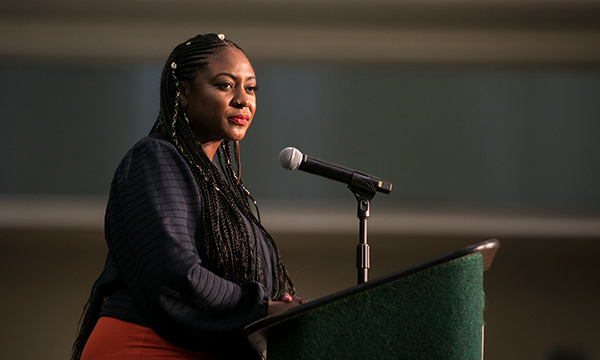 Alicia Garza brought a timely message to Sacramento State on Sept. 18. (Sacramento State/Jessica Vernone) | Gallery
Alicia Garza brought a timely message to Sacramento State on Sept. 18. (Sacramento State/Jessica Vernone) | GalleryAlicia Garza, social activist behind the Black Lives Matter movement, brought a powerful message of racial justice and culture change to Sacramento State on Sept. 18, kicking off the University's Green and Gold Speaker Series.
Garza’s lecture – “Black Lives Matter: From the local streets to a national dialogue” – attracted an audience of about 1,100 to the University Union Ballroom. There, she shared her vision for sparking comprehensive societal change and ending social injustice, police brutality and systemic racism in America.
Before the presentation, President Robert S. Nelsen said he wanted students, faculty and staff attending the event to do so with a willingness to engage in further discussion. Through that participation, Nelsen said “together we can make positive changes in our community and in this country.”
“We are honored that she has agreed to come to our campus to continue the critical and difficult discussions that are necessary to move us forward as a community and to create understanding," he said.
Garza was direct – blunt at times – in offering her vision of the Black Lives Matter message. She said it is not about hating police or white people – "It's not always about you all," she quipped – but rather opposing and working to change things that block black people's pursuit freedom and opportunity.
She said a chance exists for change and urged people to be active and engaged to "fight state violence ... to fight the extrajudicial murders of black people."
She challenged those in attendance to "uproot the disease that plagues this country, which is racism and white supremacy. That is what Black Lives Matter is about.”
The event was presented by the Centers for Diversity and Inclusion with several campus sponsors, including the Division of Criminal Justice, a strategic partnership meant to encourage better communication and understanding.
“Support from Criminal Justice for this event is meaningful and important,” said John Johnson, director of Sacramento State’s Centers for Diversity and Inclusion. “The message of Black Lives Matter is often misrepresented as anti-police, but it is really anti-state-sanctioned violence, anti-black disposability, and pro-social justice.
“Black Lives Matter shines a light, holds up a mirror, but it also demands that we look and do something about what we see.”
Ernest Uwazie, Criminal Justice Department chair, said he planned to attend the event along with many of his students.
“The Division of Criminal Justice is supportive of programs that promote critical dialogues about diversity and social justice, and such is expected of Alicia Garza’s presentation,” Uwazie said, calling for “a presentation about a fair justice system and best practices in police-community relations as well as robust discussions about positive change and pathways to peace building in our Sacramento community and beyond.”
The Black Lives Matter movement came into existence following the 2012 killing of Trayvon Martin, an African American teen, by a Neighborhood Watch volunteer in Florida. The hashtag, #BlackLivesMatter, coined by Garza, Patrisse Cullors and Opal Tometi, swelled in popularity two years later during protests in Ferguson, Mo., after the fatal police shooting of another black man, Michael Brown. In Sacramento, the rallying cry-turned-civil-rights-crusade continues to be on the front lines following the killing of Stephon Clark by Sacramento police in March 2018.
“A conversation about what we can do to prevent senseless violence in our community is definitely warranted,” Johnson said. “Alicia Garza turned outrage into mass movement and perhaps what is most important is that she helped to empower communities to take action, to stand up and be counted, to be heard. We must do that now. All of us.”
The Black Lives Matter Global Network has 40 chapters in four countries. This year, Garza founded the Black Futures Lab, an organization that designs new ways to build black political power in cities and states. She also is the Strategy and Partnerships director for the National Domestic Workers Alliance, which supports millions of domestic workers in the United States.
Garza has an MA in Ethnic Studies from San Francisco State University and a BA in Anthropology and Sociology from the University of California, San Diego.
Additional campus sponsors include the Office of Inclusive Excellence; Student Organizations and Leadership; Black Student Union; Taskforce for the Center for Race, Immigration and Social Justice; Student Academic Success and Educational Equity Programs; and Services for Students with Disabilities.
The Green and Gold Speaker Series event is free, but tickets are required and can be reserved on the presentation’s Eventbrite page – Anita Fitzhugh
